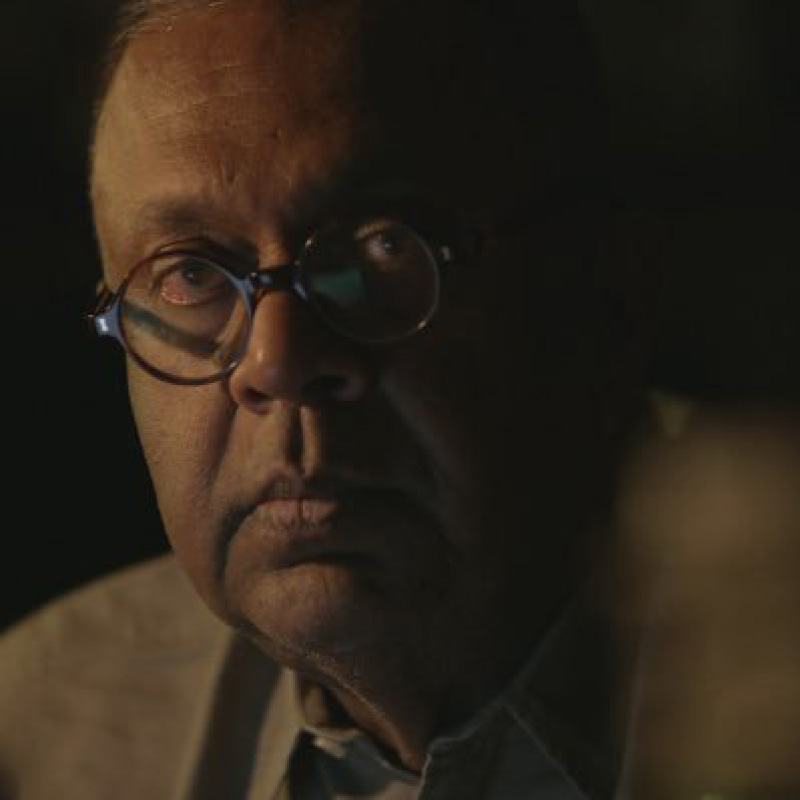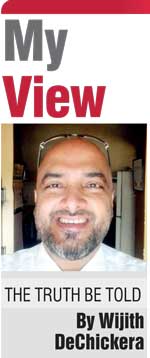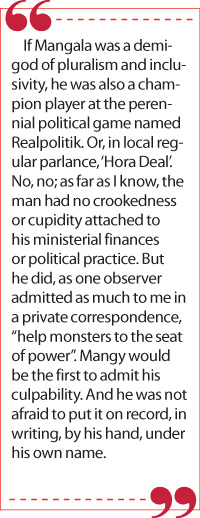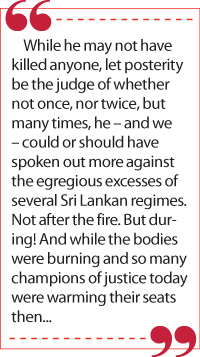Wednesday Feb 18, 2026
Wednesday Feb 18, 2026
Saturday, 28 August 2021 00:50 - - {{hitsCtrl.values.hits}}

LIPID profile – Liberal, Inclusivist, Pluralist, Iconoclast, Democrat; the more likeable side of an ambitious paradox of a politico: realist with a dream, a player of realpolitik who was the joker in the pack
 I did not take very well to Mangala Samaraweera when I first met him in 1995. There I was, hell-bent as I thought I was then, on talking about telecom policy and terrorist politics. While all he wanted to know was the name of a gadfly columnist whose pseudonym irked him a little and whose weekly column irritated him a lot more.
I did not take very well to Mangala Samaraweera when I first met him in 1995. There I was, hell-bent as I thought I was then, on talking about telecom policy and terrorist politics. While all he wanted to know was the name of a gadfly columnist whose pseudonym irked him a little and whose weekly column irritated him a lot more.
“I say, tell me, child, who is this Suranimala fellow?” he bellowed, leaning towards me over his ornate desk at the Telecom Ministry in the Fort.
I wouldn’t tell him. I didn’t know then who that idiosyncratic scribe was, being a humble subeditor at the time, moonlighting as an interviewer for the startup operation that was the old Leader. I couldn’t give up the real name of the gremlin in Chandrika’s machine even had I been privy to the secret.
He was not pleased. “Tchach!” he ejaculated, in the old English sense of the word ‘exploded’ – or some other singular syllable from his thick lips. This moist derision adequately conveyed his opinion of that pesky penman, plus his obvious annoyance at the obduracy of his present interlocutor.
The rest of the interview, needless to say, did not go down a treat. With that said, at the end of a gruelling hour, Mangala walked me to the front door of his ministry headquarters, which was swarming with armed guards (there was no CFA then), to bid me a “cheery bye-bye” and “come again” with no apparent rancour.
At the time, I did neither know, nor acknowledge until later, that it was characteristic of the man who would cross swords with my newspaper for years to come to be so chummy and cavalier.
After all, I was but a callow youth then. And he was only an erstwhile fashion designer, sporting a floral shirt and blue denim jeans as his office-wear, now masquerading as a minister of the state. Both of us, it could be said, had some growing up to do.
Over the next decade or so, Mangala was to fight many pitched battles with the editorial head of the national weekly where I went on to join the management team and editorial ranks. But even in the midst of heated exchanges between anonymous and Op-Ed columns on the one hand, and ministerial pique at press conferences (in response to all that columnar vitriol) on the other, there was a certain je ne sais quoi about the man. Just ask Chandrika to translate...
A joie de vivre! A ‘just do it or get out of my way’ look and feel. An almost juvenile delight in doing and saying just the canny thing to survive his critics’ most scathing attacks and their so-called exposés.
I was dismayed when a satirical frontispiece rejoicing in the succinct moniker of ‘In A Nutshell’ – to which I made a modest contribution, now and then, in the early days – rejected my nom de plume (‘Mangler Summer-Reviewer’) for him... in favour of a less honourable nom de guerre (‘Mangy’).
 ‘Dog days’
‘Dog days’
The late honourable Mangala Samaraweera was anything but mangy – if not always as honourable as his hagiographies now make him out be, posthumously.
For instance, he was not free of the taint of caste-ism in local by-elections while aspiring to a greater mantle in the more cosmopolitan milieu of national elections and international relations when he eventually ascended those platforms and places. But there was often something of “man’s best friend” about him if you were on his side of the fence. If not, he could be thought of as a braggart or a bully, or boss...
In the heady days of CBK’s remarkable experiment in national reconciliation, he was the Rottweiler of a riven Republic in strife whose days were numbered even way back then. In latter times, he was a reasonable facsimile of a bull mastiff for his fellow Realpolitikos, guarding the entrance to some stygian netherworld; which is to say, the corridors of power.
He would bask in the adulation of friends and sycophants, but tear the enemy at the gate to shreds. And always, even when he bit the hand that fed him – or let the real Enemy slip past the gate into the House, literally and metaphorically – there was a sad hang-dog expression that was a cross between Liberace on a bad day and Churchill on a good one.
Intermezzo
If you’ve persevered this far and are perhaps wondering when the trenchant analysis will begin, you’d be advised to give the rest of this piece a miss... and consider yourself well rid of tripe and piffle.
For the only reason I decided to brave my own critics and touch quill to ink is the extraordinary outpouring of sentiment that I can only describe as ‘toxic political positivity’.
Not that anything I write can set the record straight on Mangala. But in some small measure, I hope to helm a more discerning readership towards a less unreasonable epitaph for the late Minister Samaraweera. And invite you to take stock, together with me, of what the other side of midnight may hold for all of us now that he is gone... into a purple sunset with maybe deluded choirs singing hosannas to a pragmatist whose eulogies must leave him – and them, if they understood irony – a trifle blue in the face...
For, were they not listening when this much-lamented politician of today said of his ilk in some forgotten yesterday that people “do not have to worship them” (politicos)? Pray, that future generations learn this lesson – and soon... Mangy – in his brusque way – once made the point rather brutally at a school function to which he’d been invited where the welcoming students garlanded the satyr and worshipped the beast, only to have their wrists slapped. He meant well... the idiotic veneration of politicians, no matter how innocent, outraged him.
 Let us take stock
Let us take stock
First, might I invite you to sample some of the more moving sentiments shared on social media in the immediate aftermath of that telecom titan’s demise? As in this challenger:
“If you’re using your phone or internet to degrade a man after his death, just do some research into Sri Lankan history. If not for that man, you might still be waiting for your landline many years after applying for a phone connection. Everyone has their faults. Nobody’s perfect. At least he did something. What have you done?”
(Indeed. It’s a primer in parliamentary politics, propped up by an electorate where voters have the same question – before, with curiosity; afterwards, with horror – at their elected representatives. Eg – What have you done? Or – What have you done!)
What Mangy did to liberalise telecom may well have to be balanced by the heavy burden that a financial regimen that placed the onus on the poor to the benefit of the corporate players may have to be weighed. But that is the province of economists and other gloomy analysts.
Then, there was this ‘teary bye-bye’ from a college batch-mate:
“Gone too soon. Rather than mourning your departure, I celebrate your bold and principled conduct in life that made you a unique and rare politician of our times. Good night, sweet prince!”
(Touching, isn’t it? However, in ministerial praxis as much as getting that T-bone – no, not Telecom-backbone – well done, the trick is not to probe the ‘tender’ (ahem!) meat too much. Well done, though, on identifying the uniqueness. As for the rarity – well, we’ll soon come to that... as the actress said to the bishop – or the junior minister said to the fledgling reporter.)
And, in staccato bursts of emotion mixed with personalised appraisal, here’s another nod or bow:
“A diplomat, politician, statesman. Above all, an amazing human being. RIP.”
(BTW: one woman’s diplomat or ambassador is another man’s anarchist or diabolical traitor. As for politician, that’s both a job identification as much as a jeering insult. But hmm... yes, statesman – perhaps, as one admirer online phrased it succinctly: “He was the best president Sri Lanka never had.” Mangala said so too, and he wasn’t being modest; merely quirkily outspoken as usual. The country will come to miss his candour in a less sanguine age. Pity, though, that for a personality so blunt, his political machine lacked its master’s forthright temperament; but was instrumental in character assassination, as is typical of dirty politics.)
 The caravan moves on
The caravan moves on
Of course, there were cynical dogs who barked at the passing caravan of praise on fleeting social media’s soon-to-be forgotten circus. With its every juggler, contortionist and two-bit obituarist hymning the dead elephant in the room with paeans of praise. But some sceptics did carp...
“The blogosphere is going bonkers with plaudits for the man. And in an era where genuine/sincere liberal politicians are a matter of taste, and just as rare, I suppose the encomiums should not be very surprising. But as for me and my ilk – especially journalists from the 1990s vintage of a then truly bipartisan Sri Lanka, I can only wish for him that the ‘dustbin of history’ (to which he was wont to violently relegate the Fourth Estate when they criticised him on untenable policies and pragmatic politics) will not be his own receptacle or final resting-place. Last but by no means least, ‘de mortuis nil nisi bonum’ – nothing but good about the dead... so let memory and mindfulness remember only Mangala’s avant-garde telecommunication policies which fast-tracked national development like nothing ever before at the turn of the century, and his courage later in the face of (let us say) ‘challenging characters’ on the national political scene, as well as the larger-than-life liberal he was. Sri Lanka’s ‘Warwick the Kingmaker’ is dead... long live liberal politics!”
Ay, there’s the rub. If Mangala was a demigod of pluralism and inclusivity, he was also a champion player at the perennial political game named Realpolitik. Or, in local regular parlance, ‘Hora Deal’.
No, no; as far as I know, the man had no crookedness or cupidity attached to his ministerial finances or political practice. Not, at least, after Lasantha of the Leader was compelled to cease and desist from hurling the slings and arrows of outrageous fortune at this poor Innocent by law court and uncanny backroom parleying.
But he did, as one observer admitted as much to me in a private correspondence, “help monsters to the seat of power”. Mangy would be the first to admit his culpability. And he was not afraid to put it on record, in writing, by his hand, under his own name. One has to admire such an admission as much as one rues the pragmatist who let the Persians around the pass at Thermopylae by a backdoor.
Political-coup-wise, Mangala was more Greek than the Greeks.
In fact, he made something of a habit of it. Not once. But even twice was not enough for his gargantuan ambition and appetite to play grand chamberlain. And now you know how many times he gave a goon – or worse, a fool – a leg-up. They have a saying in mobster capital Chicago about once being happenstance; twice coincidence; and the third time, it’s enemy action!
Of small and cold consolation, then, that the Mikados of today need no Lord High Poo-bah to bring them into and keep them in power any more.
Which reminds me: my private correspondent whom I mentioned above responded to a post of mine – something to the effect that: “Let the dustbin of history not be his final resting-place as much as he would have it be the receptacle for a free media” – with: “Well, at least he didn’t kill anyone.” To which I was constrained to reply: “Our basis of gratitude towards politicos is very telling!”
Others, perhaps little realising the heavy unintended irony of comparison, have added to the hallelujah chorus by shouting to anyone who would hear that ‘he was not a rogue’ or ‘he was not a racist’.
True... yes, while he may not have killed anyone, let posterity be the judge of whether not once, nor twice, but many times, he – and we – could or should have spoken out more against the egregious excesses of several Sri Lankan regimes. Not after the fire. But during! And while the bodies were burning and so many champions of justice today were warming their seats then...
One last thing
I can tell you now, dear Mangy, who Suranimala is... I mean, was. But you probably know already. Since you were not Media Minister at the time that that thorn in the then regime’s flesh was left, lying, a bleeding piece of earth, under your former friends’ watch over the Fourth Estate. Despite, no doubt, your previous valiant efforts to defend what you and a former president once eloquently described as ‘the freedom of the wild ass’. Pity that you fell out with the powers that be; or you might have been able to save your former nemesis? But happy ending in that it made you a fervent critic of an increasingly oppressive regime in the last days of the Great War.
Therefore, let us hope that at the Great Press Conference in the sky – if you believe in such, as much as we are still called upon to subscribe to ‘Saubagya Dekma’ over ‘Daeng Saepada?’ – there will be some measure of reconciliation between that other undying bleeding-heart laced with generous lashings of pragmatism, Lasantha, and your intrepid LIPID self...
So what’s ‘LIPID’ about Mangler other than his Summery Review of a countenance?
L – Liberal. In politics, it helped him bridge many divides: between old guard and new entrants, traditionalists and revolutionaries, left and right wings – though some may wish he hadn’t. In civil society, he united diverse vested interests in the common good and national interest. In private, he lived unrepentantly – as much as in public, he championed reforms for others’ sake... but that roseate wine needs no bush here...
I – Inclusivist. His pithy worldview spoke volumes for the tolerance that less philosophical but pseudo-religious others couldn’t, didn’t, wouldn’t ever understand. “Sri Lanka is not a Sinhala Buddhist country but a country belonging to all who have taken Sri Lanka as their motherland,” he asserted.
P – Pluralist. In an era when (in his own words) “a war was raging on in the north and an equally tragic youth in insurrection was engulfing the south”, Mangala “dreamt mostly of peace where all Sri Lankans – in spite of their caste, class, race or religion – could live in harmony and dignity”. But unlike many other visionaries whose ‘I have a dream’ spiel is only for consumption by gullible would-be fellow travellers, Minister Samaraweera walked the talk. That he deliberately, carefully, pointedly spoke truth to power – even the powers he had ushered to the throne room, and his political peers no less – sets his words and his vision apart from his contemporary champions of a tolerant, inclusive, pluralistic, united, island-race...
I – Iconoclast. Not above playing the nationalist card, this self-professed practising Buddhist didn’t hesitate to relegate theories and tracts inimitable to the Tathagatha’s teachings to ‘the dustbin of history’. But strangely, it endeared him to the monks at large and masses in general. And only some incontrovertible species of media-men felt their noses rubbed in the garbage-bin by his trash-talking.
D – Democrat. At best, he believed in the sovereignty of the people’s will. At worst, he exploited fickle mob mentalities with pragmatic panache. To swing popular sentiment in favour of dark horses that no sensible punter would touch with a bargepole. In reality, he truly deeply desired a Sri Lanka in which all people would be equal in every sense, and damn your conservative claptrap.
For that alone, I will stand by his virtual grave in silence a quiet moment and mull over why a close friend and family member of his wrote back to me: “Mangala is a loss for all of us. Mostly for our country and its future. Trust the younger generation will carry forward his dream for Sri Lanka.”
(Journalist | Editor-at-Large of LMD and former Chief Sub Editor of The Sunday Leader | Writer WFH)